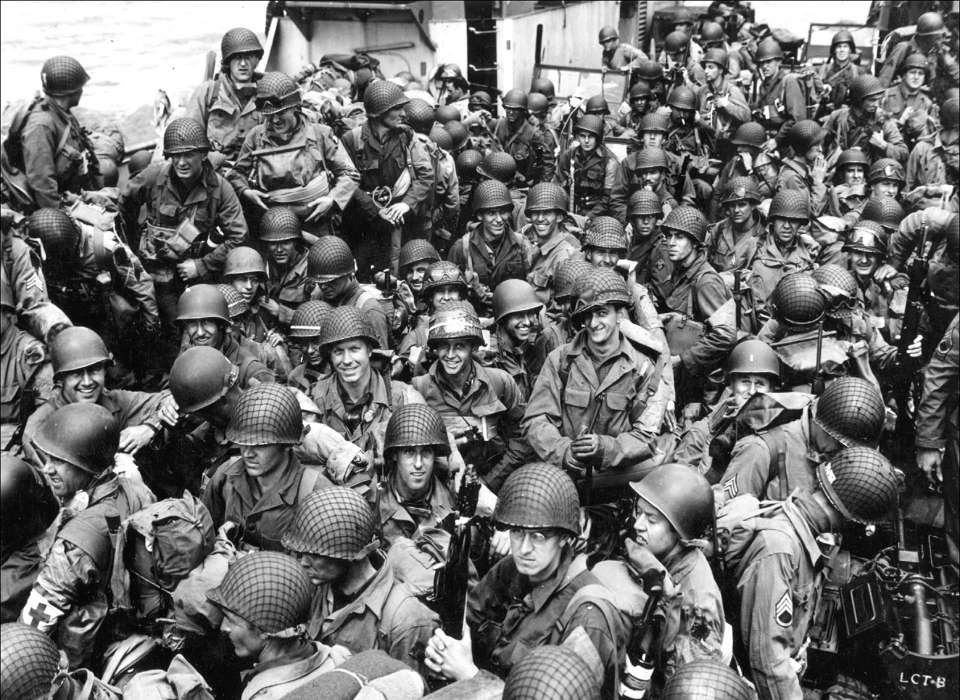
On June 6, 1944, the long-awaited Allied landing in northern France began. Facing Hitler’s Atlantic Wall, soldiers of the United States, United Kingdom, Canada, and other Allied nations landed on beaches in Normandy, beginning a campaign which lasted until July 24, 1944 (The National WWII Museum, New Orleans).
By Joanne Thompson
After numerous delays and major planning changes, D-Day was set for June 5. However, on June 4, as paratroopers prepared to board the C-47 Skytrains which would carry them behind enemy lines, weather conditions deteriorated. The decision was made to delay 24 hours, requiring part of the naval force bound for Utah beach to return to port. With a small window of opportunity in the weather, Eisenhower made the decision to go—D-Day would be June 6, 1944. Paratroops began landing after midnight as the massive invasion force took station off the coast. A short naval and aerial bombardment preceded the landings, which began at around 6:30 am.
Things went badly from the beginning for American forces landing at Omaha and Utah. At Omaha beach, the resistance was devastating for the early waves of troops. The landing force bound for Utah was blown off course, resulting in troops going ashore nearly a mile down the beach. American airborne forces of the 101st and 82nd Airborne Divisions were scattered behind Utah, sometimes tens of miles off target. To the west, the landings went more to plan for British and Canadian forces. Despite challenges and sometimes fierce enemy opposition, Allied forces persisted in establishing a beachhead in Normandy.1
History has proved how D-Day changed the trajectory of WWII.
June 6 was clearly an incredibly important day for the world. Think about how different our world might be if not for the Allied engagement at this historic moment. Yet how many of us recall stories told to us by parents or grandparents and have repeated those stories to our children? Stories of unquestioning bravery and sacrificial acts toward comrades? From what I have read, it seems as if the whole country rallied around the effort to support and protect others: from Victory gardens to Rosie the Riveter. It would serve us well to remind ourselves of the selflessness of our forefathers, particularly at this time of divisiveness. Movies such as Saving Private Ryan, or The Longest Day tell the story of D-Day, and are available through streaming channels.
This day in June offers us an opportunity to remember and share the stories of how the Allies came together in a way that demonstrated their love for all humankind by coming to the aid of those being marginalized. Some might say that war is based on hate, and they would be correct. In the best of circumstances, war is based on a hatred of oppression, injustice, inequality, greed and cruelty to others. Proverbs 82:3-4 reminds us “Defend the weak and the fatherless; uphold the cause of the poor and the oppressed. Rescue the weak and the needy; deliver them from the hand of the wicked.”
And yet it is important to remember the path of peace shown by Jesus. While Jesus was expected to come with an army to fight the Kings of his day, he chose a different path. One of peace and nonviolence.
The example of Jesus and our history of attempting to make peace through war is full of tension. And yet we live in a world that is broken, and sometimes that brokenness costs people who are trying their best to create a more just and equitable world their very lives.
This year, as we remember those who died on D-Day, and in every war since, may we continue to work tirelessly toward peace in every area of our lives, exhausting all means to right oppression and injustice without resorting to physical combat.
1 https://www.nationalww2museum.org/war/topics/d-day-and-normandy-campaign